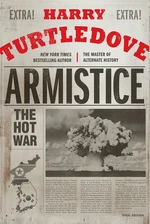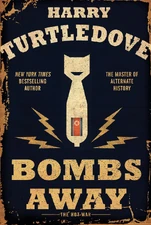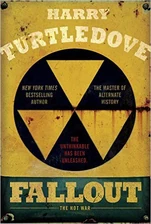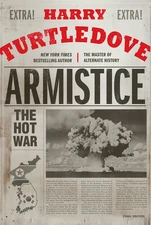| Armistice | |
|---|---|
 | |
| Author | Harry Turtledove |
| Series | The Hot War |
| Genre(s) | Alternate history |
| Publisher | Del Rey |
| Publication date | July 18, 2017 |
| Preceded by | Fallout |
Armistice is the third and final volume of Harry Turtledove's alternate history series The Hot War. It was released on July 18th, 2017. The working title was All the King's Horses.
The novel begins in May, 1952, in the immediate aftermath of the Soviet Union's successful attack on the East Coast of the United States, which has destroyed most of the Legislative and Executive branches. However, President Harry Truman presses on in both the European and in Korean theaters.
The war in Europe reaches its climax when the US successfully tests the hydrogen bomb. When US intelligence learns that Stalin is in Omsk, the US successfully deploys a hydrogen bomb, killing Stalin. Stalin's immediate successor, Lavrenty Beria, calls for a continuation of the war, despite the heavy losses to the Soviet military and unrest in the Soviet Union's satellites. The universally despised Beria is toppled after a month and is succeeded by Vyacheslav Molotov. Fighting slows down with neither side launching atomic bombings or any larger scale offensives, leading to an armistice agreement brokered by Truman, Clement Attlee, and Charles de Gaulle on the one side and Molotov on the other. NATO and the Soviet Union agree to withdrawn to the 1950 borders before the start of the Korean war. The Soviets are given a free hand to reassert control in their satellite states as long as they avoid the use of atomic bombs. However, while the Soviet Union agrees to no longer support Mao Tse-Tung or Kim Il-sung, Molotov pointedly refuses to negotiate a peace in Korea.
While Mao is initially defiant, the loss of Soviet aid and the specter of the hydrogen bomb finally forces Chou En-Lai to seek peace with the U.S. using Yugoslavia as an intermediary. The border of the two Koreas are restored to the status quo antebellum, with Chou assuring Truman that China can keep North Korea in line.
With the war at an end, the Soviets begin a brutal campaign to reassert control over their eastern satellites, the Baltic states, and the other republics of the USSR. Despite fierce opposition, the Soviets reassert control in the short term.
In the U.S., the long process of rebuilding begins. With the legislative branch shattered, the electoral college cannot meet, and Truman opts to suspend the presidential election scheduled for November 1952. Congressional elections do take place, and the Republicans handily capture both houses. With Presidential Elections planned for the next year however, this would only be a 3 year term. As the novel ends on the stroke of midnight, January 1, 1953, Dwight Eisenhower seems likely to be the next Republican presidential nominee. However, Richard Nixon, one of the few members of Congress to have survived the Soviet attack, is asserting himself on the political stage.
| |||||||||||||||||||||


